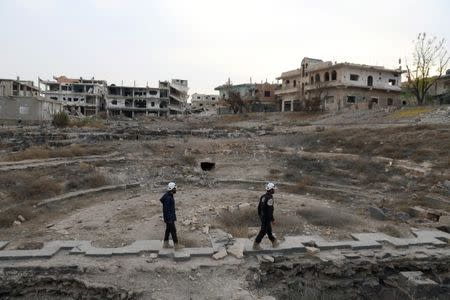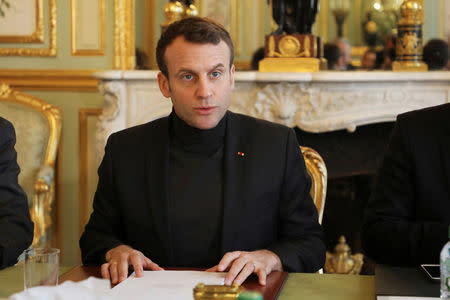Enough red lines, time to act, Syria's White Helmets tell Macron
By John Irish PARIS (Reuters) - France should stop talking about red lines and focus on real action to persuade the main actors in Syria's conflict to agree a ceasefire, the vice-president of the Syria Civil Defence, or "White Helmets", said on Tuesday. French President Emmanuel Macron said in May that Paris would not accept a failure to open humanitarian corridors in Syria or the use of chemical weapons. Both, he said, represented a "red line". However, nine months later and with the Syrian civil war entering its eighth year, France is struggling to wield influence on Syria, as thousands more are killed, suspected chemical weapons attacks resume and violence surges in the rebel-held areas of eastern Ghouta and Idlib. "Use another word because all the red lines have been crossed and the (Syrians) are disappointed with these words," Abdulrahman Almawwas told reporters in Paris. "It's time to take real action and not just talk about red lines." Speaking after meeting senior French officials, including Macron's chief diplomatic adviser, Almawwas said France needed to put pressure on the main protagonists, such as pushing for a no-fly zone, even though he acknowledged France had few options. "If we wait for the parties on the ground, then we will wait forever," he said. "We need a real ceasefire and then discuss a political solution when all the guns have shut down." The White Helmets work in opposition-held territory and have rescued thousands of civilians from caught up in the fighting. The United Nations on Monday said the suffering of civilians had worsened since it called for a ceasefire six days ago in a humanitarian initiative quickly derailed by the intense bombardment of eastern Ghouta, an opposition enclave outside Damascus, and an offensive against rebels in the northwestern Idlib province. Almawwas said the group's financing for 2018 from foreign governments had dropped to $12 million from $18 million a year earlier. He said the bombing campaign in eastern Ghouta over the last week had killed or wounded about 400 people. "It's the same scenario as Aleppo. There is no food, humanitarian aid and no medical evacuations," he said referring to a government offensive to regain control of Syria's second city in 2016. (Reporting by John Irish; Editing by Richard Lough)


